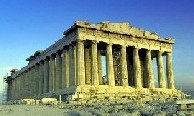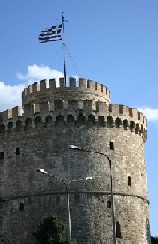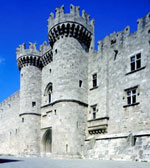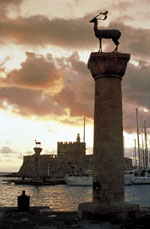

Greece & Turkey Information
Greece Useful Info, Demographics & History
Menu |
Footsteps of Paul
Israel
Seven Churches Cruise Retreats
________________
Blog
Photo
Gallery
Individual Travelers
Where Do I Begin
Travel Ministry
FAQ
TravelSafe
Insurance
Helpful Links
What
others say
Contact Us
Greece Useful information, Demographics & History
Population: 10,964,020.
Capital: Athens (population of 3,192,606)
Area: Greece is situated in Southeastern Europe, with an area of 131,957 sq.km.
Prime Minister: Mr Constantinos Karamanlis. Greece is a Parliamentary Democracy.
Greek
Flag:

Parliament: Three hundred elected members with elections held every four years
Currency: is euro. member state of E.U. since 1981.The Greek economy adopts the principles of free enterprise
Electric Current:The standard in Greece is 230V AC (50Hz). Appliances from North America require a transformer and British ones an adaptor.
Public
Holidays 2006
1 January: New
Year's Day
6 January: Epiphany
6 March : Ash Monday
25 March: National Holiday
23 and 24 April : Easter
1 May : May Day
12 June: Whit Monday ( Holiday only for public sector)
15 August: Dormition (Assumption) of The Virgin
28 October: National Holiday
25 and 26 December: Christmas
Shopping: Greece is the ideal destination to shop for a wide variety of products, catering to everybody’s tastes and wishes. Prices are very reasonable in relation to product quality and visitors will be able to find something for every budget.
Shops
are open Monday through Friday from 09.00 till 14.30 and on Tuesday, Thursday
and Friday also from 17.30 through 20.30. On Saturday shops open from 09.00
till 15.00, while they are closed on Sunday. Supermarkets and kiosks may
stay open till 22.00.
More specifically, in the centre of large urban areas as well as in tourist
areas, tourist shops and kiosks are open from early in the morning till
late at night, seven days a week.
History:The
earliest traces of human habitation in Greece date from the Palaeolithic
period (120,000 – 10,000 B.C. approximately).
During the subsequent Neolithic period (7,000 - 3,000 B.C. approximately),
civilisation flourishes in Greece. A plethora of Neolithic settlements and
cemeteries have been discovered in Thessaly (Sesklo, Dimini), Macedonia,
the Peloponnese et al.
The beginning of the Bronze Age (3000 - 1100 B.C. approx.) is marked by
the appearance of the first urban centres in the Aegean (Poliochni on the
island of Limnos). Flourishing settlements are found on Crete, the Greek
mainland, the Cyclades and in the Northeastern Aegean, regions where characteristic
cultural patterns develop. At the beginning of the 2nd millennium B.C. organised
palatial societies appear on Minoan Crete, resulting in the development
of the first scripts. Using the palace of Knossos as their centre, the Minoans
create a communication network with peoples of the Eastern Mediterranean,
adopt elements of their cultures, and in turn have a decisive influence
on the cultures of the Greek mainland and the Aegean islands.
On the Greek mainland, the Mycenaeans, taking advantage of the destructions
caused on Crete by the eruption of the volcano on Santorini (around 1500
B.C.), step forward and become the leading force in the Aegean during the
last centuries of the 2nd millennium B.C. The Mycenaean citadels in Mycenae,
Tiryns, Pylos, Thebes, Gla, Athens and Iolkós constitute the centres
of bureaucratically organised kingdoms. The extensive destruction of the
Mycenaean centres around 1200 B.C. led to the decline of the Mycenaean civilisation
and the migration of large parts of the population to the coasts of Asia
Minor and Cyprus (1st Greek colonisation).
After approximately two centuries of economic and cultural inactivity, known
as the Dark Ages (1150 – 900 B.C.), the Geometric period follows (9th
– 8th centuries B.C.), the beginning of the Greek renaissance. It
is marked by the formation of the Greek city-states, the creation of the
Greek alphabet and the composition of the Homeric epics (end of the 8th
century B.C.). The subsequent Archaic Period (7th- 6th centuries B.C.) is
an era of major social and political changes. The Greek city-states establish
colonies as far as Spain to the West, the Black Sea to the North, and North
Africa to the South (2nd Greek colonisation) and lay the foundation for
the peak of the classical period. The hallmark of the classical period (5th
– 4th centuries B.C.) is the cultural and political predominance of
Athens; so much so that the second half of the 5th century B.C. is called
the “Golden Age” of Pericles. With the end of the Peloponnesian
War, in 404 B.C., Athens loses its dominance.
New forces emerge during the 4th century B.C. With Philip II and his son,
Alexander, Macedonians start playing a leading role in Greece. Alexander’s
expedition to the East and the conquest of regions as far as the Indus River
radically change the situation in the then-known world. With the death of
Alexander, the vast empire that he created is divided among his generals,
leading to the creation of the kingdoms that will prevail during the Hellenistic
times (3rd -1st centuries B.C.). During this period, the Greek cities remain
more or less autonomous, but they have lost much of their old power and
prestige. The complete and final conquest of Greece by the Romans in 146
B.C. incorporates the country into the vast Roman Empire. During Roman occupation
(1st century B.C. – 3rd century A.D.), most of the Roman emperors,
who are admirers of the Greek culture, are friendly towards the Greek cities,
and especially Athens. Through the travels of Apostle Paul during the 1st
century B.C., Christianity, the new religion that will gradually dethrone
the worship of the Dodecatheon (the Twelve Gods), is spread all over Greece.
Nowadays visitors of the country can see the “fingerprints”
of Greek history from the Palaeolithic period to the Roman era at the hundreds
of archaeological sites, as well as in the archaeological museums and collections
scattered all over the country (the Greek mainland and the islands).
The decision of Constantine the Great to move the empire’s capital
from Rome to Constantinople (324 A.D.) shifted the focus to the eastern
part of the empire. This move marks the beginning of the Byzantine era during
which Greece is part of the Byzantine Empire. After 1204, when Constantinople
is seized by Western crusaders, parts of Greece are given away to Western
leaders, while the Venetians occupy strategic positions in the Aegean (islands
or coastal cities), in order to control trade routes. The reoccupation of
Constantinople by the Byzantines in 1262 marks the last phase in the empire’s
existence. The Ottomans gradually start seizing parts of the empire from
the 14th century A.D. and complete its destruction with the conquest of
Constantinople in 1453. Crete was the last part of Greece to be occupied
by the Ottomans in 1669. Approximately four centuries of Ottoman occupation
follow until the beginning of the Greek War of Independence in 1821.
Numerous monuments from the Byzantine period and the Ottoman occupation
still subsist, such as Byzantine and Post-Byzantine churches and monasteries,
Ottoman buildings, enchanting Byzantine and Frankish castles, various other
monuments as well as traditional settlements , many of which retain their
Ottoman and, partly, Byzantine structure.
The result of the Greek War of Independence was the formation of an independent
Greek kingdom in 1830, which, however, covered only a restricted territory.
During the 19th and the beginning of the 20th centuries, new areas with
Greek populations are gradually integrated into the Greek state. Greece’s
territory reaches a maximum after the end of World War I, in 1920, with
the substantial contribution of prime minister Eleftherios Venizelos. The
Greek state takes its contemporary form after the end of World War II with
the incorporation of the Dodecanese Islands.
In 1974, after a seven-year dictatorship, a referendum was held and the
system of government changed from a constitutional monarchy to a Presidential
Parliamentary Democracy; Greece has been a member of the European Community/Union
since 1981.
Paul
Footsteps
AD
32/35 Paul’s conversion
45/46 Death of James
46/47 1st missionary journey (Acts 13-14)
48/51 2nd missionary journey (Acts 15:36 – 18:22)
50 Paul reaches Corinth
54-57 Paul stays in Ephesus (Acts 19)
57-58 Paul in Greece (Acts 20)
PAUL:
- Paul’s ministry spanned 30 years (Acts)
- Because of Paul, Christianity spread to Syria, Turkey and Greece
- Paul was in Caesarea for 2 years. Luke was with him and during the shipwreck
- Paul was instrumental in the death of Stephen
- Paul’s 1st reported sermon was at Antioch
- Paul was a major historian who spread the Word which changed the world
- Paul was a Rabbi - Well-versed in Greek literature
- Paul started his journeys in Turkey, then to Greece, then to Rome
- Paul wrote 1 Corinthians written in Ephesus
- 2 Corinthians written in Macedonia (Syria) after hearing that the Corinthian
church is restoring good relations with Paul. It was written around AD56.
It was the most intensely personal of Paul’s letters. Paul feels an
intense burden for the church and their spiritual progress.
- Romans written in Corinth (Greece) – Known as Paul’s gospel
manifesto
- Galatians written on Paul’s 3rd missionary journey
- Timothy – Written to Christians at Corinth and groups at Athens
and Cenchrea
- Paul addressed Ephesians elders (Christians). Only address mentioned by
Luke in Acts
- Paul foresaw what would happen to the Church mentioned in Rev 2:2
- Paul wrote: Romans, 1 & 2 Corinthians, Galatians, Ephesians, Colossians,
Philippians, Philemon, 1 & 2 Thessalonians, 1 & 2 Timothy, Titus
ATHENS:
- Athens – Home of the Epicureans (Lovers of pleasure). Athenians
thought of Jesus and the resurrection as 2 deities.
- Some Greeks believed in immorality of the soul but not resurrection of
the body
- Paul called this city a city full of idols.
- Location of the Agora (marketplace) where Paul spoke.
- Also location of small hill below the Acropolis known as the Areogagus.
Paul left Athens without starting a church and only saw a few converts.
He left and went to Corinth.
- Paul called it a “A myriad of idols.” He debated this argument
in the Agora (marketplace).
BEREA
- Paul received a receptive audience.
- A sizeable church was established.
- When the Jews heard of a growing church, they sought to harm Paul.
- Silas and Timothy stayed behind, but Paul left for Athens.
CORINTH
- It stands between the Aegean and Adriatic seas.
- Paul stayed there 18 months on his 2nd journey. He founded the church
(AD 54). The city was destroyed and rebuilt by the Romans. Known as the
cosmopolitan city where Greeks, Latins, Syrians, Asiatics, Egyptians and
Jews lived.
- 1 & 2 Thessalonians written in Corinth around AD50-51
- Paul felt that it he establishes a church here, the Word will quickly
spread far and wide. The town was dominated by the Temple of Aphrodite (goddess
of Love). It was built on the heights of the Acropolis, where thousands
of prostitutes and a racial hotchpotch gave the city an unsavory name. The
city was a by-word for excess and sexual license. The city was made up of
a few Jews and lots of gentiles, men of wealth but mostly lower classes.
- Many were converts from pagan background who prided themselves on intellectual
prowess.
- Paul found friends in Aquila and Priscilla who were tentmakers. Paul stayed
here 18 months.
- Paul wrote 2 letters to the Thessalonians.
- Cenchreae is a port city in Corinth.
- Sprawling seaport 3 ½ miles wide. It offered direct passage from
the Aegean to the Adriatic Seas. Nero attempted to build a canal across
it, but this was not realized until the 19th Century. Known as a cosmopolitan
center of commerce and trade. It enjoyed lavish prosperity but attracted
unsavory characters. Strabo said there were 1,000 sacred prostitutes in
the Temple of Aphrodite. Upon his arrival he met Aquila and Priscilla who
had recently moved to Corinth from Rome after the emperor of Rome said that
all the Jews had to leave Rome.
- Paul preached in the synagogues weekly. Jews were incensed and lied about
Paul. Paul was brought before Gallio. Gallio said it was jealousy and refused
to adjudicate the case. Paul returned to Antioch.
AQUILA
& PRISCILLA
- Aquila and Priscilla (A&P) were co-travelers with Paul to Corinth,
Ephesus and Rome
- Aquila & Priscilla were tentmakers and leather workers.
- Paul stayed at Aquila & Priscilla’s home for over 2 years.
- Apollos’ (an Alexandrian) salvation was due to A&P. He became
a man of great influence in the Corinthian church
DIANNA
A multi-breasted goddess. Also known as Artemis. Temple was erected to her
was one of the 7 Wonders of the World. It is 4 times the size of the Parthenon.
The “Sacred Stone” was a meteorite, supposed to resemble the
goddess and was kept in the Temple.
EPHESUS
- It was a great commercial center. The city was a bridgehead between East
& West
- Non-Jews were prohibited from entering the inner court of the Temple.
- One of the 3 major cities of Eastern Europe. Paul taught here for over
2 years. Paul ran into adversaries calling them, “the beasts of Ephesus,”
He said that the Corinthian church was turning the gospel into “freedom
for moral anarchy.”
- Then Paul sent Silas to feel the place out, before going there himself.
- Major metropolis of the Eastern Empire. Home of Dianna, goddess of fertility
also known as Artemis. Paul stayed there 2-3 years on his 2nd journey.
- Numerous miracles were performed here. Sent Timothy from here to Corinth
to see how the church was doing.
- Demetrius was threatened by Paul’s success of the gospel and summoned
other silversmiths and encouraged them to incite a riot.
- 2 of Paul’s companions Gaius and Artistarchus were seized, dragged
into Ephesian theatre of 24,000 spectators.
- Paul was unharmed but moved to Macedonia and then to Greece.
MARS
HILL
- Known as the “Hill of the Areopagus” where Paul delivered
messages to the Athenian philosophers. It was used solely for debates. Paul
debated the resurrection of Christ, but philosophers mocked this idea. There
were only a few converts and no church was established.
PHILIPPI
- Paul spoke to groups of women including Lydia who was Paul’s 1st
convert in Europe.
- Paul exorcized the slave girl on his way to pray. Paul & Silas were
put in prison. The
- Prison doors opened and they walked out. Jailer took Paul & Silas
home with him, where
- The Jailer and his family were converted and baptized into Christianity.
Paul claimed to be a Roman. Paul left with Silas & Timothy for Thessaloniki.
- Site of the pivotal battle in the Roman civil war: A battle between Cassius
and Marcus vs. Anthony and Octavian. Anthony and Octavian won decisively
which started the expansion of the Gospel.
- This led to the creation of the East/West Empire. The place where Paul
and Silas were beaten.
THESSOLINIKI
- Sea port capital city of Macedonia (Syria)
- The location of Jason’s house (were Paul stayed). Jason was attached
and arrested. When Jason was released, Paul, Silas and Timothy left town.
- For 3 consecutive Sundays, Paul expounded on the gospel and many were
added to the kingdom. Jewish leaders were upset and accused them of treason.
A mob stormed Jason’s house when they could not find Paul, they beat
up Jason. Because of this beating, Paul and Silas left for Berea
GREECE
- During the Hellenistic age called the Greek age, some Greeks especially
those living in Alexandria adopted Greek as their main language. The Septuagint
was translated into Greek and commissioned by Ptolemyll and completed by
the middle of 2BC.
- During the 3 months Paul was in Greece, he visited: Philippi, Thessalonica,
Berea, and Corinth and Athens. Paul wrote Romans when he was in Greece





The Life of Paul the Apostle with TV host Rick Steves(40
min. 32 sec.)
Click PLAY twice then wait for the pause button to appear
*ALL
Views and Ideas on this program are NOT endorsed by "Bible On Tour"...this
video is offered for informational purposes only